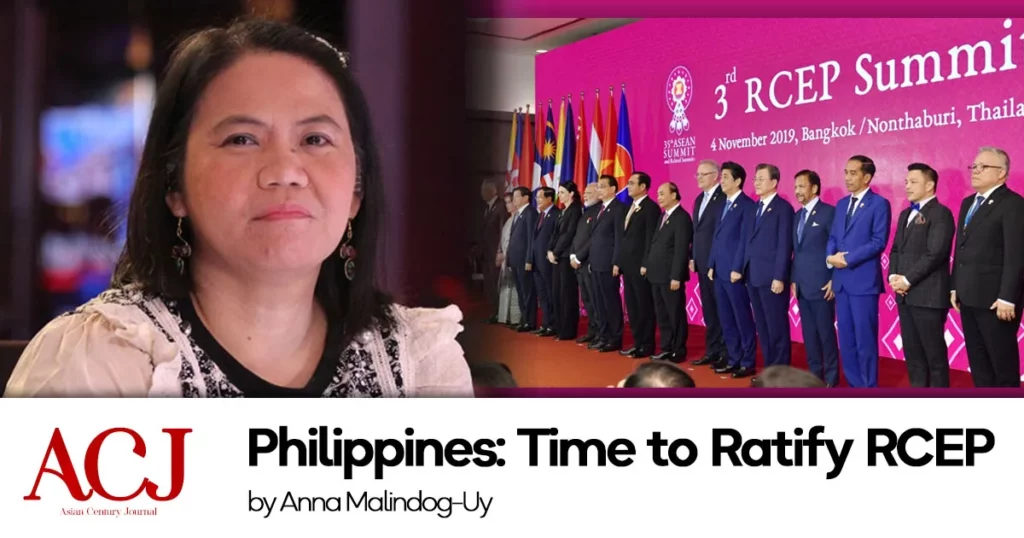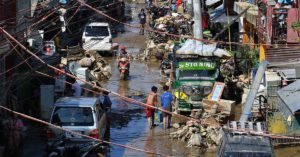
Among the 15 member-states of the Regional Comprehensive Economic Partnership (RCEP), only the Philippines has not ratified the biggest trade deal in history and across the globe. The most recent addition to RCEP is Indonesia.
Even Myanmar had already sent its instrument of ratification to the ASEAN secretariat around September of last year (2021). However, given Myanmar’s volatile political situation, ASEAN member-states have yet to decide on this matter.
To note, Former President Rodrigo Duterte signed the ratification of RCEP, but for RCEP to be fully effective, it needs the concurrence of the Philippine Senate. Despite the Department of Trade and Industry (DTI) and other government agencies engaged in the negotiations of RCEP, business leaders and some economic think-tanks in the country calling senators to ratify RCEP, but the senate still failed to do so until today.
According to some reports, RCEP faces opposition and resistance from several non-governmental organizations (NGOs), primarily agriculture-based groups, who have been asking members of the Philippine Senate to abandon the trade pact.
Reservations and Misconceptions
Indeed, it seems that until now, the fate of RCEP in the Philippines is still in limbo. Even President Ferdinand Marcos Jr. appears to have reservations about pushing for the ratification of RCEP. He expressed concerns about the country’s competitiveness, especially in the agricultural sector and local farmers, and he wants the country to be competitively ready first before ratifying RCEP. Marcos intends to assess the country’s competitiveness first before pursuing RCEP’s ratification. He wants another look at RCEP and studies its possible impact on farmers.
But then again, the most pertinent question that needs to be asked is whether this is a good strategy and the way forward. Will the Philippines lose more by following this approach, or will it be better off?
Time to Ratify RCEP
Entering a trade pact like RCEP and opening the economy to the world is not necessarily new for the Philippines. The Philippines is a member of the World Trade Organization (WTO), through which a significant increase in tariff bindings, extensive tariff reductions, elimination of quantitative and other non-tariff measures, and commitments in many services sectors have been introduced.
At the very onset, the Philippines’ participation in the WTO and ASEAN Plus One FTAs, such as the ASEAN Australia New Zealand FTA, ASEAN China FTA, and ASEAN Korea FTA, has liberalized trade on a multilateral basis, reduced trade barriers, and lowered tariffs.
Concerning the ambivalence of President Marcos on RCEP, more particularly its impact on the agricultural sector of the country, it has been pointed out by DTI, at least during the previous administration, that the agricultural sector is safe with RCEP precisely because no new highly sensitive agricultural products were included from the country’s Schedule of Commitments.
These highly sensitive agricultural products include swine, poultry, potatoes, onions, garlic, cabbages, sugar, carrots, and rice. A tariff, a tax imposed by the Philippine government on imports or exports of these sensitive farm products, is still effective even if the country becomes a full member of RCEP. This means that tariffs still protect these products.
On the contrary, membership in RCEP will provide the agricultural sector with the broadest possible and wide-ranging opportunities to enhance the country’s market access, trade facilitation measures, time-bound consultation in addressing trade issues, more investments in research and development in agricultural sciences, and even manufacturing.
Filipino farmers and producers will have the opportunity to gain access to steady, secured, and cheaper farm inputs and instruments like fertilizers, pesticides, and farm machinery. Take note that around 74 percent of the country’s importation of fertilizers is from RCEP member states like China, Indonesia, Malaysia, Korea, Viet Nam, and Japan, in the same manner, that around 70 percent of the importation of insecticides is also from RCEP countries like China, Malaysia, Indonesia, Japan, and Korea. Also, when importing agricultural machinery, around 78 percent are from RCEP countries like China, Thailand, and Japan. These factors must be considered when assessing why it is vital for the Philippines to ratify RCEP as soon as possible.
Furthermore, Filipino farmers can also export their products to RCEP’s more extensive and broader market at a preferential and more trade facilitative arrangement. RCEP will also encourage investments in food processing and research & development (R&D) in agricultural sciences and technology.
In retrospect, the country’s agricultural sector will most definitely benefit from RCEP while at the same time enjoying tariff protection on the country’s sensitive agricultural products.” With this, the country enjoys the best of both worlds.
On this note, perhaps, concerning agriculture, what the Philippines should do is probably not shy away from RCEP because it is akin to protectionism or a protectionist policy. Instead, the new administration of President Marcos Jr., who happens to be the Secretary of the Department of Agriculture, should push the senate to ratify RCEP and maximize what it has to offer while simultaneously pushing for the modernization of the agricultural sector of the country. Thus far, this is the most pragmatic way forward.
More Benefits
Moreover, RCEP is also expected to bring tangible new opportunities to the business community in the Philippines, especially in creating favorable conditions for the small and medium-sized enterprises (SMEs), which are the backbone of the Philippine economy, so that they could better participate in regional economic and trade cooperation and tap into the markets of RCEP member-states while enjoying the policy dividends of this agreement.
Likewise, RCEP will help and encourage the inflow of foreign investments to the country, facilitates an opportunity to partner and form joint ventures within the region, and allows greater participation of more service providers in vital sectors such as manufacturing, creative sectors, financial services, aerospace, and shipbuilding, research and development (R&D), IT-BPO, professional services, education services, and energy, among others.
RCEP also provides a framework for regional economic and trade cooperation in the broader Asia Pacific region. It integrates and optimizes the region’s economic and trade rules in a wide range of fields, including goods, services, investment, intellectual property rights, e-commerce, and competition policy, which will further promote the integrated development of industrial chain, supply chain, and value chain in the region.
Most importantly, RCEP will provide the Philippine exporters with sources from 14 countries, including the country’s top import sources of raw materials, China and ASEAN.
RCEP will also allow Philippine traders to source intermediate goods from any of the 14 RCEP members-countries with only one certification of origin and will significantly improve the overall business environment of the Philippines.
Geopolitically speaking, RCEP is a win-through of ASEAN centrality because ASEAN was in the midst of the RCEP’s negotiation process. Thus, RCEP is a showcase of the middle-power diplomacy of ASEAN, which also means that ASEAN member states are vital players in setting the terms of engagement and rules played by RCEP.
Conclusion
No doubt, it is imperative for the Philippine Senate to ratify RCEP now or bear the consequences later. Delaying or not ratifying RCEP will result in lost opportunity for the Philippines. On that note, it’s time for the Philippines to ratify RCEP now! It’s now or never.
Source: Asian Century Journal
https://asiancenturyph.com/2022/09/17/philippines-time-to-ratify-rcep/



